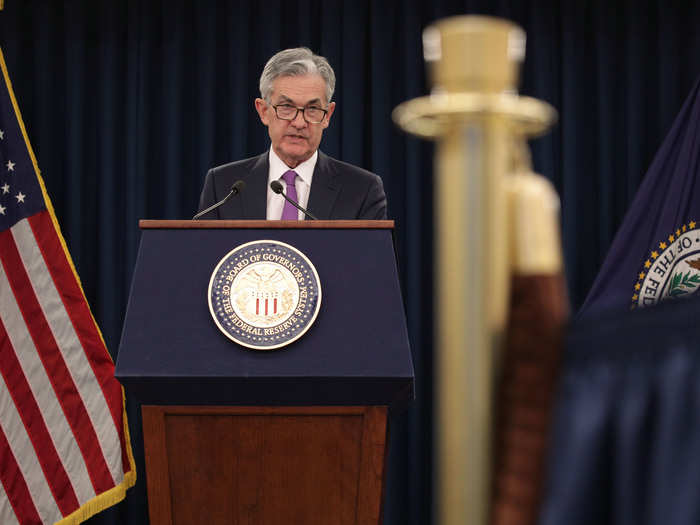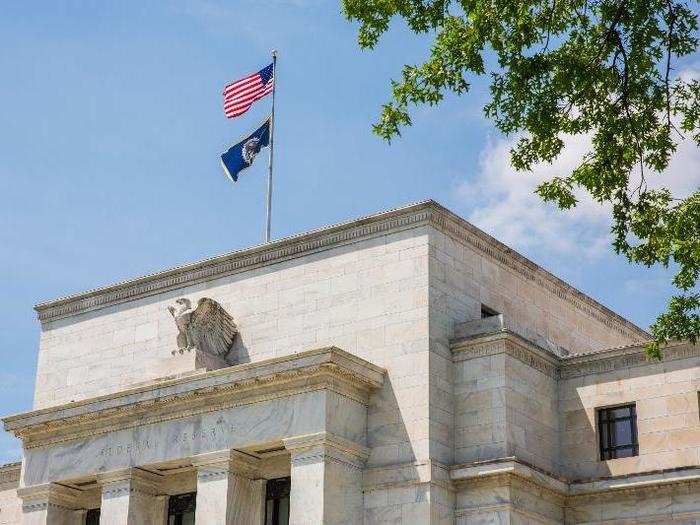- Home
- slideshows
- miscellaneous
- Wall Street weighs in on the Fed's big change
Wall Street weighs in on the Fed's big change
Initial reactions

On the next rate adjustment

"Our baseline forecast calls for one interest-rate increase later this year, likely in September. We'd stress that there's a lot of dispersion around this projection--the Fed could cut rates if conditions continue to deteriorate, or it could raise rates up to three times this year if financial markets, the global economy and inflation all move higher in short order." -Paul Eitelman, strategist at Russell Investments
"With financial conditions easing over recent weeks and the economic data still solid, we still on balance expect one more rate hike from the Fed, either at the April/May or June meeting. We would place far more emphasis on our forecast for a sharp slowdown in economic growth further ahead, which we expect will force the Fed to cut rates by 75 basis points in 2020." -Michael Pearce, senior US economist at Capital Economics
"The FOMC still thinks the economy is strong. This statement is intended to convey that strength but to ensure that markets realize that the FOMC will not be tightening monetary policy in a vacuum. We still see a hike as the most likely next policy move, and in our forecast that happens in September. However, the Fed is being as explicit as possible that it is in no hurry to raise rates anytime soon." -Seth Carpenter, economist at UBS
On the balance sheet

"The Fed had separated, two statements, one on their policy decision, the other on the balance sheet. The purpose is so that we in the market do not conflate the two. These are different decisions and tools. Setting the interest rate remains the Fed's primary policy tool. A distant second is the balance sheet." -Jim Caron, managing director of global fixed income at Morgan Stanley
"The market received the update they had been seeking with regards to the Fed's balance sheet and as the Committee said it is prepared to make adjustments. Overall, this was a positive message from the Fed as the ability to be nimble and make changes to monetary policy during periods of high uncertainty are extremely important." -Charlie Ripley, Allianz Investment Management
"In and of itself, the text of the Fed's balance sheet statement wasn’t markedly different from public comments made over the past month by Chair Powell himself and several of his deputies, but it was seen as an admission that the end of the balance sheet runoff is closer than some FOMC participants thought last year." -Ellen Zentner, economist at Morgan Stanley
On inflation and employment

"The lack of inflationary pressures is a key takeaway. In addition, the first paragraph returned to a discussion of market-based and survey-based inflation expectations separately. Treating them symmetrically was no longer possible, but the FOMC tends to be leery of putting too much weight on TIPS-based expectations." -Seth Carpenter, economist at UBS
"It's clear that recent market movements have led to a material shift in the Fed's policy reaction function. Most importantly, we would need to see inflation pick up and financial conditions ease with a resolution on some of the global downside risks." -Bank of America Merrill Lynch
"Ordinarily, with unemployment below what the Fed’s own economists consider to be ‘full employment,’ the central bank would continue to tighten monetary policy. However, with a stock market, and other markets, so clearly dependent on cheap money, the Fed has boxed itself into a corner." -Octavio Marenzi, chief executive of Opimas
"In contrast to when the Fed paused its tightening cycle in early 2016, we judge that the economy is now close to full employment. In the past couple of economic cycles, when the unemployment rate fell to the sort of level it is now, a recession followed not long after the Fed’s last rate hike. We are not forecasting a recession, but we do expect growth to slow sharply." -Simona Gambarini, analyst at Capital Economics
On the dollar and Treasurys

“As investors lower their expectations for Treasury supply, we expect nominal Treasury yields to fall relative to other developed market global government bond yields and USD OIS rates. We also believe Treasury prices will become increasingly sensitive if equity prices go down, but less sensitive if equity prices go up.” -Ellen Zentner, economist at Morgan Stanley
“The US dollar sold off across the board in response to today's dovish FOMC surprise, the result of the Fed's apparent removal of its prior hiking bias alongside explicit reference to 'patient' in the statement. Higher beta FX outperformed, likely reflecting the expectation that the Fed will err on the side of running the economy hot.” -Bank of America Merrill Lynch
Now Read:
Popular Right Now
Popular Keywords
Advertisement